Related Research Articles

Karl Marx was a German-born philosopher, economist, political theorist, historian, sociologist, journalist, and revolutionary socialist. His best-known works are the 1848 pamphlet The Communist Manifesto and the three-volume Das Kapital (1867–1894); the latter employs his critical approach of historical materialism in an analysis of capitalism and represents his greatest intellectual achievement. Marx's ideas and theories and their subsequent development, collectively known as Marxism, have exerted enormous influence on modern intellectual, economic and political history.
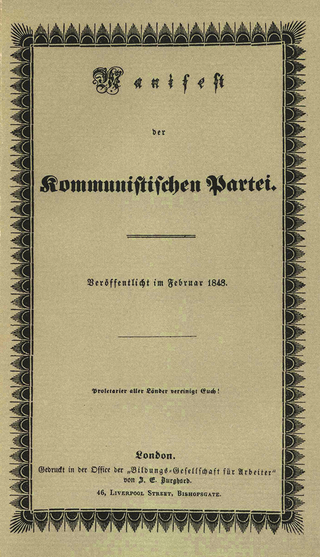
The Communist Manifesto, originally the Manifesto of the Communist Party, is a political pamphlet written by Karl Marx and Friedrich Engels, commissioned by the Communist League and originally published in London in 1848. The text is the first and most systematic attempt by Marx and Engels to codify for widespread consumption the core historical materialist idea that, as stated in the text's opening words, "the history of all hitherto existing society is the history of class struggles", in which social classes are defined by the relationship of people to the means of production. Published against the backdrop of the Revolutions of 1848 and their subsequent repression across Europe, the Manifesto remains one of the world's most influential political documents.

Friedrich Engels was a German philosopher, political theorist, historian, journalist, and revolutionary socialist. He was also a businessman and Karl Marx's closest friend and collaborator.

In economics, a commodity is an economic good, usually a resource, that specifically has full or substantial fungibility: that is, the market treats instances of the good as equivalent or nearly so with no regard to who produced them.
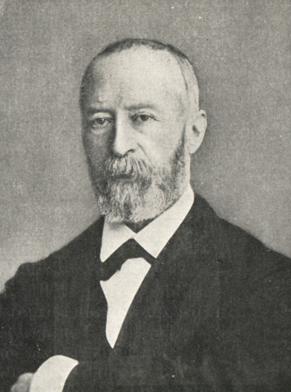
Charles Théodore Eugène Duclerc was a French journalist and politician of the Third Republic. He was a member of the editorial board of the National newspaper. Duclerc served as Minister of Finance from May through June in the Provisional government of France. Later served as prime minister from 1882 to 1883 in the third Republic.
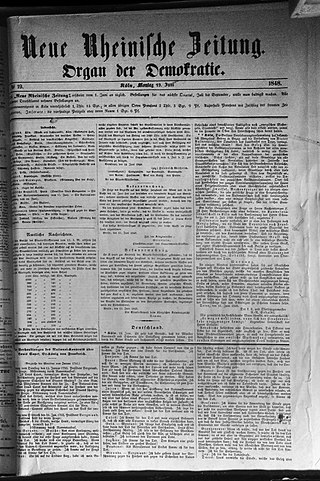
The Neue Rheinische Zeitung: Organ der Demokratie was a German daily newspaper, published by Karl Marx in Cologne between 1 June 1848 and 19 May 1849. It is recognised by historians as one of the most important dailies of the Revolutions of 1848 in Germany. The paper was regarded by its editors and readers as the successor of an earlier Cologne newspaper, the Rheinische Zeitung, also edited for a time by Karl Marx, which had been suppressed by state censorship over five years earlier.

The Origin of the Family, Private Property and the State: in the Light of the Researches of Lewis H. Morgan is an 1884 anthropological treatise by Friedrich Engels. It is partially based on notes by Karl Marx to Lewis H. Morgan's book Ancient Society (1877). The book is an early historical materialist work and is regarded as one of the first major works on family economics.

Socialism: Utopian and Scientific is a short book first published in 1880 by German-born socialist Friedrich Engels. The work was primarily extracted from a longer polemic work published in 1878, Anti-Dühring. It first appeared in the French language.

Revolution and Counter-Revolution in Germany is a book by Friedrich Engels, with contributions by Karl Marx. Originally a series of articles in the New York Daily Tribune published from 1851 to 1852 under Marx's byline, the material was first published in book form under the editorship of Eleanor Marx Aveling in 1896. It was not until 1913 that Engels' authorship was publicly known although some new editions continued to appear incorrectly listing Marx as the author as late as 1971.
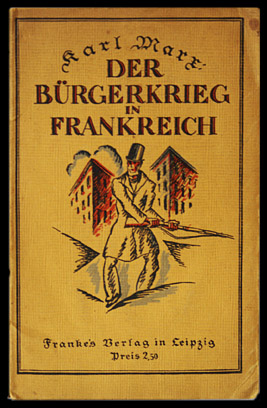
"The Civil War in France" is a pamphlet written by Karl Marx, as an official statement of the General Council of the International on the character and significance of the struggle of the Communards in the Paris Commune.
"Wage Labour and Capital" was an 1847 lecture by the critic of political economy and philosopher Karl Marx, first published as articles in the Neue Rheinische Zeitung in April 1849. It is widely considered the precursor to Marx’s influential treatise Das Kapital. It is commonly paired with Marx's 1865 speech Value, Price and Profit. In 1883, a Russian translation was published as a book and included an excerpt from Capital volume 1 in the appendix, chapter 23 on Historical Tendency of Capitalist Accumulation. In 1885, a pamphlet version was first published as an English translation. An 1885 pamphlet based on the newspaper articles was published in Hottingen-Zürich without Marx's knowledge and with a brief introduction by Friedrich Engels. The German edition was revised by Engels in 1891 and published by Vorwärts after the Anti-Socialist Laws had lapsed the previous year. In 1893, an updated English translation from the 1891 German edition was published in London.
In classical political economy and especially Karl Marx's critique of political economy, a commodity is any good or service produced by human labour and offered as a product for general sale on the market. Some other priced goods are also treated as commodities, e.g. human labor-power, works of art and natural resources, even though they may not be produced specifically for the market, or be non-reproducible goods. This problem was extensively debated by Adam Smith, David Ricardo, and Karl Rodbertus-Jagetzow, among others. Value and price are not equivalent terms in economics, and theorising the specific relationship of value to market price has been a challenge for both liberal and Marxist economists.
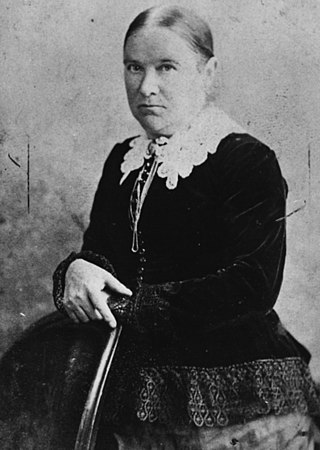
Helene or Helena Demuth was a German housekeeper who worked for Jenny and Karl Marx, and later served as the household manager and political confidante of Friedrich Engels.
Karl Marx wrote a number of notebooks on the history of technology which so far remain unpublished in English. Their whereabouts were for a long time unknown but in the past they were read and discussed by Marxist researchers.
August Hermann Ewerbeck, known by his middle name of Hermann, was a pioneer socialist political activist, writer, and translator. A physician by vocation and a German by birth, Ewerbeck is best remembered as an early political associate of Karl Marx and Friedrich Engels, as a leader of the Parisian communities of the utopian socialist organization, League of the Just, and as the translator of the French writings of Étienne Cabet and Ludwig Feuerbach into German.

Manchester has historically influenced political and social thinking in Britain and been a hotbed for new, radical thinking, particularly during the Industrial Revolution.
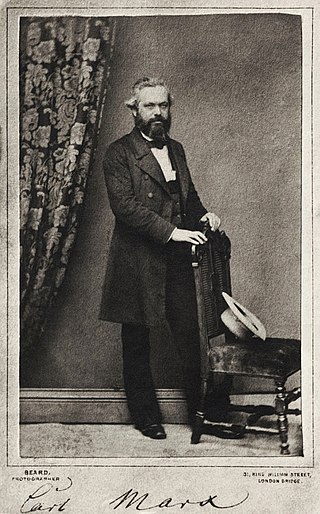
In Marxism, a theoretician is an individual who observes and writes about the condition or dynamics of society, history, or economics, making use of the main principles of Marxian socialism in the analysis.

The Communist League was an international political party established on 1 June 1847 in London, England. The organisation was formed through the merger of the League of the Just, headed by Karl Schapper, and the Communist Correspondence Committee of Brussels, Belgium, in which Karl Marx and Friedrich Engels were the dominant personalities. The Communist League is regarded as the first Marxist political party and it was on behalf of this group that Marx and Engels wrote the Communist Manifesto late in 1847. The Communist League was formally disbanded in November 1852, following the Cologne Communist Trial.
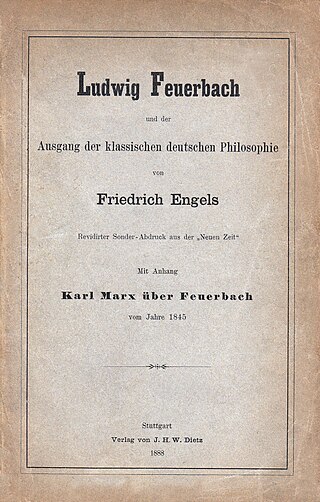
The "Theses on Feuerbach" are eleven short philosophical notes written by Karl Marx as a basic outline for the first chapter of the book The German Ideology in 1845. Like the book for which they were written, the theses were never published in Marx's lifetime, seeing print for the first time in 1888 as an appendix to a pamphlet by his co-thinker Friedrich Engels. The document is best remembered for its epigrammatic 11th and final thesis, "Philosophers have only interpreted the world, in various ways; the point, however, is to change it", which is engraved on Marx's tomb.

The Tomb of Karl Marx stands in the Eastern cemetery of Highgate Cemetery, North London, England. It commemorates the burial sites of Marx, of his wife, Jenny von Westphalen, and other members of his family. Originally buried in a different part of the Eastern cemetery, the bodies were disinterred and reburied at their present location in 1954. The tomb was designed by Laurence Bradshaw and was unveiled in 1956, in a ceremony led by Harry Pollitt, the General Secretary of the Communist Party of Great Britain, which funded the memorial.
References
- ↑ Biographical note contained in the Collected Works of Karl Marx and Frederick Engels: Volume 11 (International Publishers: New York, 1979) p. 692.